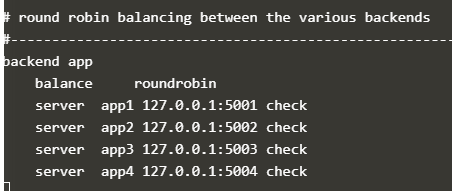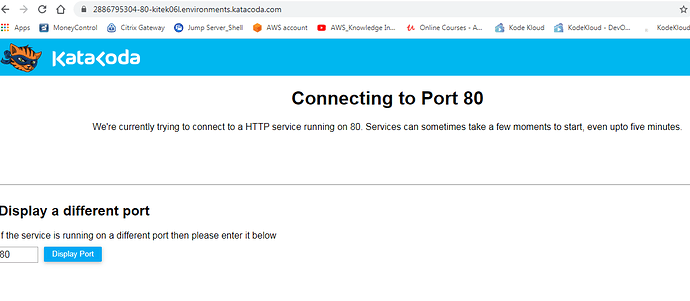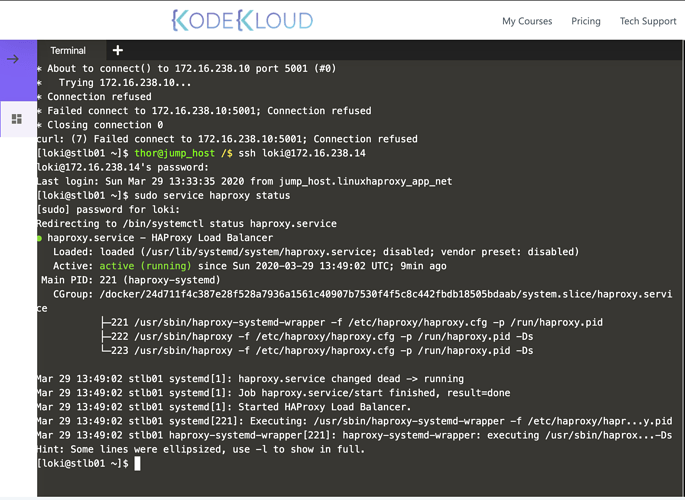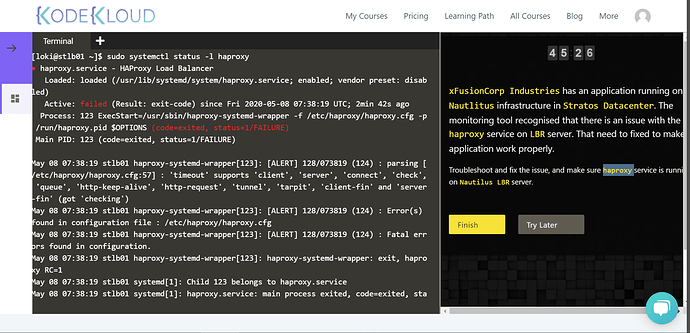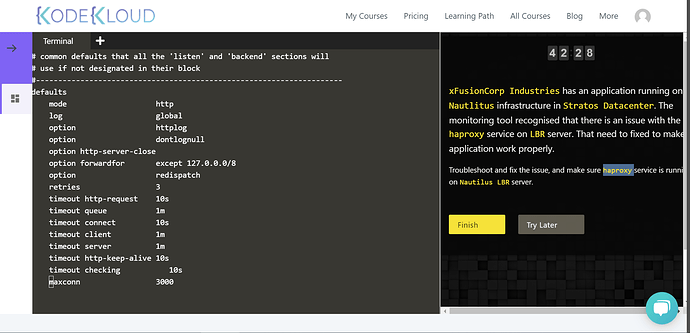I was not able to isolate the issue with Haproxy LBR Troubleshooting . could you please someone give some light on this . I just need the tips for haproxy.cfg file
[root@stlb01 haproxy]# haproxy -c -f haproxy.cfg
[ALERT] 064/122301 (127) : parsing [haproxy.cfg:57] : ‘timeout’ supports ‘client’, ‘server’, ‘connect’, ‘check’, ‘queue’, ‘http-keep-alive’, ‘http-request’, ‘tunnel’, ‘tarpit’, ‘client-fin’ and ‘server-fin’ (got ‘checking’)
[ALERT] 064/122301 (127) : Error(s) found in configuration file : haproxy.cfg
[ALERT] 064/122301 (127) : Fatal errors found in configuration.
[root@stlb01 haproxy]# systemctl status haproxy
● haproxy.service - HAProxy Load Balancer
Loaded: loaded (/usr/lib/systemd/system/haproxy.service; disabled; vendor preset: disabled)
Active: failed (Result: exit-code) since Thu 2020-03-05 12:28:55 UTC; 27s ago
Process: 142 ExecStart=/usr/sbin/haproxy-systemd-wrapper -f /etc/haproxy/haproxy.cfg -p /run/haproxy.pid $OPTIONS (code=exited, status=1/FAILURE)
Main PID: 142 (code=exited, status=1/FAILURE)
Mar 05 12:28:55 stlb01 haproxy-systemd-wrapper[142]: [ALERT] 064/122855 (143) : parsing [/etc/haproxy/haproxy.cfg:57] : ‘timeout’…king’)
Mar 05 12:28:55 stlb01 haproxy-systemd-wrapper[142]: [ALERT] 064/122855 (143) : Error(s) found in configuration file : /etc/hapro…xy.cfg
Mar 05 12:28:55 stlb01 haproxy-systemd-wrapper[142]: [ALERT] 064/122855 (143) : Fatal errors found in configuration.
Mar 05 12:28:55 stlb01 haproxy-systemd-wrapper[142]: haproxy-systemd-wrapper: exit, haproxy RC=1
Mar 05 12:28:55 stlb01 systemd[1]: Child 142 belongs to haproxy.service
Mar 05 12:28:55 stlb01 systemd[1]: haproxy.service: main process exited, code=exited, status=1/FAILURE
Mar 05 12:28:55 stlb01 systemd[1]: haproxy.service changed running → failed
Mar 05 12:28:55 stlb01 systemd[1]: Unit haproxy.service entered failed state.
Mar 05 12:28:55 stlb01 systemd[1]: haproxy.service failed.
Mar 05 12:28:55 stlb01 systemd[1]: haproxy.service: cgroup is empty
Hint: Some lines were ellipsized, use -l to show in full.
[root@stlb01 haproxy]# vi haproxy.cfg
[root@stlb01 haproxy]# cat haproxy.cfg
#---------------------------------------------------------------------
Example configuration for a possible web application. See the
full configuration options online.
http://haproxy.1wt.eu/download/1.4/doc/configuration.txt
#---------------------------------------------------------------------
#---------------------------------------------------------------------
Global settings
#---------------------------------------------------------------------
global
# to have these messages end up in /var/log/haproxy.log you will
# need to:
#
# 1) configure syslog to accept network log events. This is done
# by adding the ‘-r’ option to the SYSLOGD_OPTIONS in
# /etc/sysconfig/syslog
#
# 2) configure local2 events to go to the /var/log/haproxy.log
# file. A line like the following can be added to
# /etc/sysconfig/syslog
#
# local2.* /var/log/haproxy.log
#
log 127.0.0.1 local2
chroot /var/lib/haproxy
pidfile /var/run/haproxy.pid
maxconn 4000
user haproxy
group haproxy
daemon
# turn on stats unix socket
stats socket /var/lib/haproxy/stats
#---------------------------------------------------------------------
common defaults that all the ‘listen’ and ‘backend’ sections will
use if not designated in their block
#---------------------------------------------------------------------
defaults
mode http
log global
option httplog
option dontlognull
option http-server-close
option forwardfor except 127.0.0.0/8
option redispatch
retries 3
timeout http-request 10s
timeout queue 1m
timeout connect 10s
timeout client 1m
timeout server 1m
timeout http-keep-alive 10s
timeout checking 10s
maxconn 3000
#---------------------------------------------------------------------
main frontend which proxys to the backends
#---------------------------------------------------------------------
frontend main *:5000
acl url_static path_beg -i /static /images /javascript /stylesheets
acl url_static path_end -i .jpg .gif .png .css .js
use_backend static if url_static
default_backend app
#---------------------------------------------------------------------
static backend for serving up images, stylesheets and such
#---------------------------------------------------------------------
backend static
balance roundrobin
server static 127.0.0.1:4331 check
#---------------------------------------------------------------------
round robin balancing between the various backends
#---------------------------------------------------------------------
backend app
balance roundrobin
server app1 127.0.0.1:5001 check
server app2 127.0.0.1:5002 check
server app3 127.0.0.1:5003 check
server app4 127.0.0.1:5004 check

